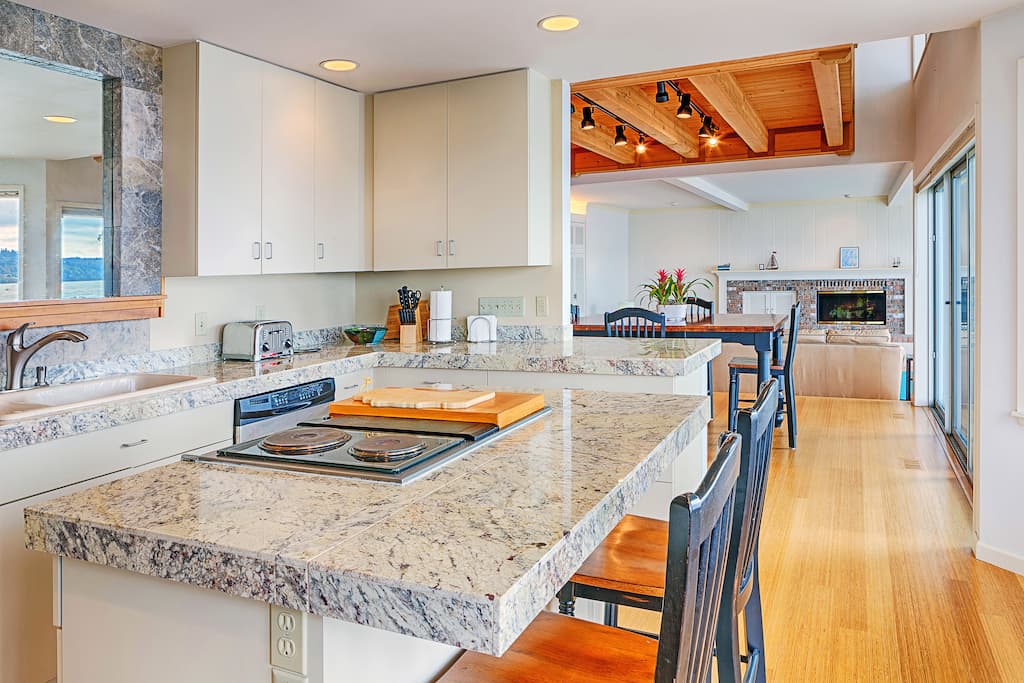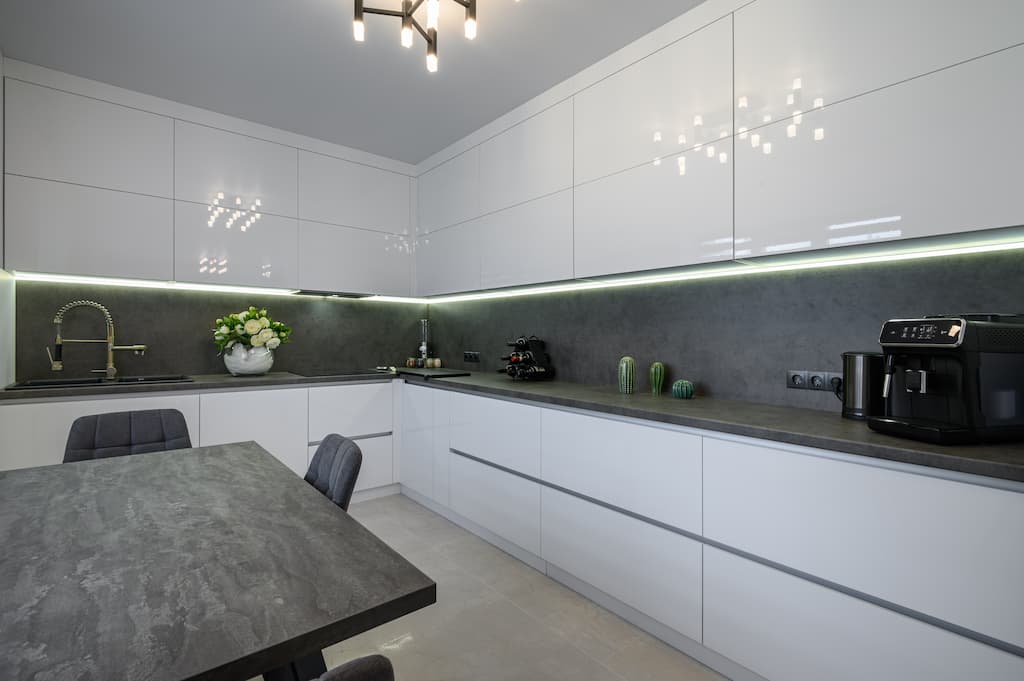Create a simple yet effective cleaning solution at home to remove stains from a granite tabletop. Mix baking soda and water to form a paste, apply it to the stain, and leave it covered with plastic wrap for 24 hours. Afterward, gently wipe away the paste with a soft cloth. This method is particularly effective for oil-based stains. Please refer to the full article above for more detailed instructions and additional tips. This guide offers details about how to remove stains from granite kitchen countertops, along with added insights on maintenance, stain prevention, and regular maintenance.
Table of Contents
ToggleUnderstanding Your Granite Countertop and General Cleaning
Kitchen countertops are often the unsung heroes of our homes, bearing the brunt of everyday cooking activities. Granite, known for its high durability and aesthetic appeal, is a popular choice for kitchen countertops. However, even these stalwarts are susceptible to staining. Granite is a tough and hard-wearing material, ideal for kitchen countertops. However, its porous nature makes it susceptible to staining if not properly sealed. Regularly applying a quality impregnating sealer can help delay the absorption of liquids and protect your countertop from staining. Remember, even with a good sealant; you need to wipe off spills promptly to prevent potential staining.
- Before tackling stains, ensure your countertop is clean and free from debris.
- Avoid using harsh chemical cleaners that could damage the sealant or the granite. Instead, use mild dish soap, rinse thoroughly with clean water, and dry with a soft cloth.
- To prevent staining, seal your countertops regularly, wipe up spills promptly, and consider using coasters or placemats to protect your countertop’s surface.
Methods of Removing Common Stains
Different stains require varying methods of removal. Here are detailed steps for tackling common kitchen stains:
- Soap Scum Buildup: Over time, soap residue can leave a dull film on your granite countertops. Mix 1 tablespoon of ammonia with 1 cup of water, spray it on the soapy surface, and then rinse it off. If you don’t have ammonia, use a 1:1 solution of isopropyl alcohol and water. Be cautious, as frequent use may damage the sealant over time.
- Oil-Based Stains: Oil-based stains darken the granite’s surface, typically from cooking oil, butter, or meat. A baking soda and water poultice can effectively lift these stains. Spread this paste over the stain, cover it with a plastic film, and leave it to dry for 24 to 48 hours. Then, scrape it off gently, rinse it with clean water, and dry the area. Repeat this process until the stain is entirely removed.
- Organic Stains: Coffee, fruits, and other organic materials often leave stubborn brown stains. A spray of 12% hydrogen peroxide can effectively lift these. Wait for the bubbling to cease, then wipe the area with a damp cloth. Repeat until the stain disappears.
- Rust Stains: Rust rings can occur from wet cans. To remove these, sprinkle baking soda over the stain, moisten it with water, and let it sit for a few minutes. Then, gently scrub the stain using a circular motion with a sponge. Rinse the area with a damp cloth and repeat the process until the rust stain disappears.
Routine Maintenance for Your Granite Countertops
Beyond addressing spills and stains, regular maintenance is key to keeping your granite countertops in top shape.
- Clean them daily with warm water and mild soap, followed by drying them with a soft cloth to prevent water spots.
- Once a year, or when water droplets no longer bead up on the surface, it’s time to reseal your countertops. Follow the manufacturer’s instructions for the best results.
How to Prevent Stain: Best Practices for Granite Countertops
While it’s crucial to understand how to remove different types of stains, prevention is always the best course of action. Here are some helpful tips to keep your granite countertop in pristine condition:
- Use Coasters and Trivets: Place coasters under glasses, especially those containing juice, wine, or coffee. Similarly, use trivets or mats under hot pans and pots to prevent potential heat damage and avoid unnecessary spills.
- Use Cutting Boards: Avoid cutting directly on the granite surface. Not only can this harm your knives, but it could also lead to scratches on the countertop.
- Avoid Harsh Cleaners: Acidic and harsh cleaners can etch the granite surface over time, making it more susceptible to staining. Stick to pH-neutral cleaners specifically made for granite.
- Clean Spills Immediately: The longer a spill sits on the countertop, the higher the risk of it seeping into the granite and causing a stain. Promptly clean any spills, especially oil, wine, juice, or coffee.
How to Deal with Stubborn Stains: A Step Further
If a stain is particularly stubborn and doesn’t respond to the methods outlined above, you may need to take a more aggressive approach:
Use a Commercial Stain Remover: There are many excellent commercial stain removers available specifically for granite. These are formulated to tackle tough stains and are usually applied in a similar manner to homemade poultices.
Call in the Professionals: If all else fails, don’t risk further damage by continuing to experiment. Professional stone care experts have the knowledge and equipment to tackle stubborn stains without risking further damage to your granite countertop.
How to Maintain Your Granite Countertops: Long-Term Care
To ensure your countertops remain in top condition for years, periodic professional deep cleaning and sealing services can be beneficial. These services penetrate deeper than everyday cleaning and sealing products, reaching into the granite’s pores for a thorough clean.
Consult a professional service provider to understand how often your granite countertop might need these services. The frequency can depend on several factors, including the specific type of granite, its usage, and your personal preference for how you want it to look.
How to Choose the Right Products for Your Granite Countertops
Understanding the variety of products available for your granite countertops can make your cleaning and maintenance routine more effective and less time-consuming. Here are a few key products to consider:
Daily Cleaners: Invest in a quality daily granite cleaner. These are formulated to safely clean stone surfaces without causing any damage. They can help maintain the shine and luster of your countertops while providing a fresh, clean scent.
Sealers: Quality sealers for granite countertops are crucial to prevent stains from penetrating the surface. A good sealer will provide a protective barrier, preventing liquids from seeping into the porous granite material.
Polish: Granite polish is not necessary for maintenance, but it can help to enhance the shine and luster of your countertops. Remember to only use products that are safe for natural stone.
Other Natural Stone Countertops: Care and Maintenance
While this guide focuses on granite, it’s worth noting that different natural stones have different care requirements. For example, marble is more sensitive to acidic substances; even mild acid can cause etching. Soapstone is non-porous and doesn’t require sealing, but it might need regular oiling to keep it looking its best. Always ensure that your cleaning and maintenance routine is suitable for the specific type of stone you have.
Conclusion
With the right care and maintenance, your granite countertops can remain an elegant centerpiece in your kitchen. Understanding how to effectively handle different types of stains and regular upkeep can help preserve their beauty for years. However, if a stain proves too stubborn, don’t hesitate to call in a professional.
Regular care and prompt attention to spills will ensure your granite kitchen countertops remain as stunning as the day they were installed.
Remember, the longevity of your granite countertops largely depends on immediate action when stains occur, using appropriate products, and following an effective cleaning and maintenance routine. Whether dealing with stubborn stains or regular cleaning, the key is to take prompt action and use products safe for natural stone.
The bottom line: Treat your granite countertops well, and they’ll reward you with a lifetime of service and style. And remember, when in doubt, always consult a professional.





